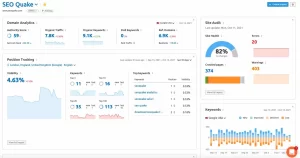
Finding the top keywords for your ecommerce brand is crucial for optimizing your website’s visibility in search engine results and driving targeted traffic. Here are some steps to help you find the best keywords for your ecommerce brand:
Understand Your Audience: Start by understanding your target audience and their search behavior. Identify their demographics, preferences, pain points, and the language they use when searching for products or services online.
Brainstorm Seed Keywords: Make a list of seed keywords relevant to your ecommerce brand. These are broad terms or phrases that describe your products or services. Consider including product names, categories, features, and benefits.
Use Keyword Research Tools: Utilize keyword research tools such as Google Keyword Planner, SEMrush, Ahrefs, or Ubersuggest to expand your list of keywords. These tools provide valuable insights into search volume, competition, and related keywords.

Analyze Competitors: Study your competitors’ websites and identify the keywords they are targeting. Look for keywords they are ranking for organically, as well as their paid search keywords. This can provide valuable insights into keyword opportunities in your niche.
Long-Tail Keywords: Include long-tail keywords in your list, which are longer and more specific keyword phrases. Long-tail keywords typically have lower search volume but higher conversion rates as they target more specific search queries.
Consider User Intent: Focus on keywords that align with the user intent behind their searches. Are they looking for information, comparison, or ready to make a purchase? Tailor your keyword strategy accordingly to capture users at different stages of the buyer’s journey.
Location-Based Keywords: If your ecommerce brand serves a specific geographic location, incorporate location-based keywords into your strategy. This can include city names, regional identifiers, or local landmarks relevant to your target audience.
Seasonal and Trending Keywords: Identify seasonal trends, holidays, or events relevant to your ecommerce brand and incorporate related keywords into your strategy. Stay updated on current trends and incorporate trending keywords when relevant.
Organize Keywords: Group your keywords into categories or themes based on relevance and search intent. This will help you create targeted content and optimize your website’s structure for better user experience and SEO.
Monitor and Refine: Regularly monitor the performance of your chosen keywords using analytics tools. Track their rankings, search volume, and conversion rates over time. Refine your keyword strategy based on performance data and evolving trends in your industry.
By following these steps and conducting thorough keyword research, you can identify the top keywords for your ecommerce brand and develop an effective SEO strategy to improve your website’s visibility and drive targeted traffic and conversions.



 +91 7905834592
+91 7905834592
 Enquiry Now
Enquiry Now
 piyushmnm@gmail.com
piyushmnm@gmail.com
 piyush.gupta384
piyush.gupta384
Reviews
There are no reviews yet. Be the first one to write one.